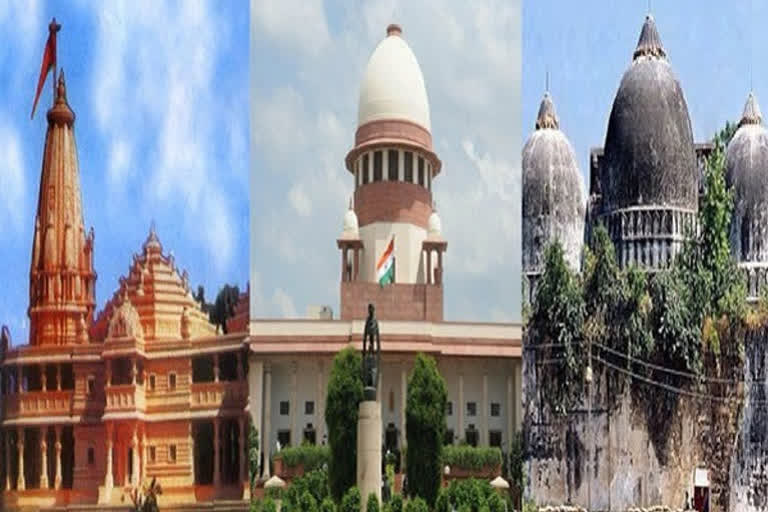New Delhi: The crucial day-to-day hearing in the politically sensitive Ram Janmabhoomi-Babri Masjid case in the Supreme Court will enter the 5th day on Tuesday with the counsel for the deity, ''Ram Lalla Virajman'', re-commencing arguments for claim over the entire 2.77-acre disputed land in Ayodhya.
The hearing before a 5-judge Constitution bench, headed by Chief Justice Ranjan Gogoi, assumes significance following its query on Friday as to whether anyone from the ''Raghuvansha'' (descendants of Lord Ram) dynasty still resides in Ayodhya.
"We are just wondering if anyone from the ''Raghuvansha'' dynasty is still living there (at Ayodhya)," the bench said, which comprises Justices S A Bobde, D Y Chandrachud, Ashok Bhushan and S A Nazeer.
Though senior advocate K Parasaran, appearing for the deity, could not answer the query during the proceedings, BJP lawmaker Diya Kumari, a member of the erstwhile Jaipur royal family, claimed on Sunday that her family has descended from Lord Ram's son Kush.
"The court has said where are the descendants of Lord Ram... Descendants of Lord Ram are all over the world, including our family who descended from his son Kush," the MP from Rajsamand in Rajasthan said.
The lawmaker said that descendants of Lord Ram are all over the world and the dispute in Ayodhya should be resolved soon.
On the fourth day of the hearing, Parasaran had responded to the apex court's query as to how the ''Janmasthanam'' (birthplace of deity) can be regarded as a "juristic person" having stakes as a litigant in the case.
"The idol is not necessary in the Hinduism for a place to be regarded as a temple," he had said, adding "Hindus do not worship Gods in any definite form, rather they worship them as divine incarnation having no form."
The top court, meanwhile, had made it clear that it would continue with the day-to-day hearing of the land dispute case and would consider granting mid-week breaks to senior advocate Rajeev Dhavan, counsel for Muslim parties including litigant M Siddiq, for preparing arguments.
Earlier, the bench had asked the counsel for the deity as to how the birthplace of Lord Ram can be regarded as a "juristic person" having stakes as a litigant in the case.
It had said that so far as Hindu deities are concerned, they have been legally treated as a juristic person which can hold properties and institute, defend and intervene in lawsuits. However, it had asked as to how ''Janamsthanam'' can file the case in the land dispute as a party.
Parasaran had said that even the birthplace of the deity can be considered as a juristic person.
The lawsuit filed by the deity in the Ayodhya case has also made the birthplace of Lord Ram as co-petitioner and has sought claim over the entire 2.77 acres of disputed land at Ayodhya where the structure was razed on December 6, 1992.
Fourteen appeals have been filed in the apex court against the 2010 Allahabad High Court judgment, delivered in four civil suits, that the 2.77-acre land in Ayodhya is partitioned equally among the three parties -- the Sunni Waqf Board, the Nirmohi Akhara and Ram Lalla.
On December 6, 1992, the Babri Masjid, constructed at the disputed site in the 16th century by Shia Muslim Mir Baqi, was demolished.
Also Read: UP: Man sets woman on fire after failed rape attempt



